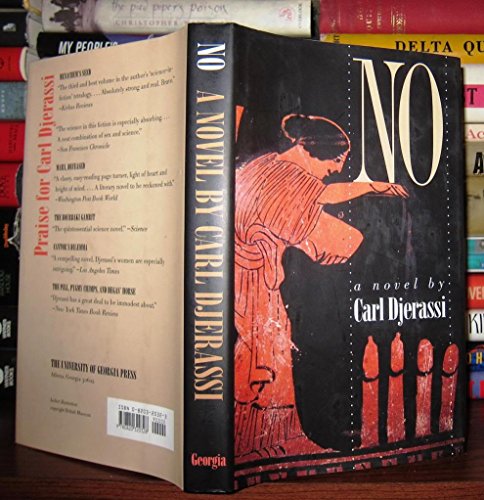No: A Novel - Hardcover

"synopsis" may belong to another edition of this title.
NO, by Carl Djerassi, is a romp of excess, a set of vaguely related plot lines that converge on insatiability and the drive to control biologic and social events. The margin of uncertainty recedes with every chapter, eventually transforming the world into financial, reproductive, and emotional formulas that erase doubt, replacing mystery with puzzles that can be cracked scientifically. The White Life, by Michael Stein, is a spare, first-person narrative, probing not greed and control but their opposites: gratitude for the unnamed gifts of the universe, humility in the face of the unknown and the unknowable, and a sense of being dazzled and nourished by the mysterious, the unexpected, and the silent revelations of ordinary life.
In NO, young molecular biologist Renu Krishnan has synthesized novel nitric oxide-releasing agents and becomes the pivotal American scientist in a global enterprise. Along the way, Renu falls in love with and marries her Israeli coinvestigator, learns hard lessons about academic politics, disclaims traditional Indian notions of womanhood, takes intellectual and financial risks in bringing her product to market, and becomes a millionaire and potential Nobelist. Along the way, the reader learns an astonishing amount about intracellular messenger molecules, mechanisms of penile tumescence, intracytoplasmic sperm injection, and prefertilization determinants of fetal sex, as well as how to pull off a successful initial public offering, how to navigate a New Drug Application through the Food and Drug Administration, and how to profit from corporate start-ups and stock options.
The intercalation of distinct plot elements is marvelously playful and revealing. As soon as nitric oxide is called "promiscuous," the various governing images of this pop-scientific thriller collapse into identity: science, venture capital, intellectual drive, and sexual drive are equated, while the intracellular becomes a metaphor for the interpersonal. All this breathless business culminates in courtship displays and big-bucks risk taking, and, at the end, everybody is rich and therefore happy.
"Mr. Dittus is bereft of something," broods The White Life's Dr. Cave about his unusual, unfocused, obscure, and willful new patient. When Cave was 13 years old, his father died of a heart attack; he became a doctor to protest his loss. Convinced that he, too, will die while his sons are teenagers, the novel's protagonist lives as if he is a temporary visitor to a strange planet, proud of his ability to exchange pleasantries with the natives, stunned by their ease in moving through a day of this stuff, and awed by the simplest aspects of ordinary life. His provisional perch grants him an astonishingly clear view of medicine, of sickness, and of life.
Cave admits to his hospital ward a man who has just had his second myocardial infarction in two weeks and who reminds him of his father. The man reminds him of himself as well -- both the doctor and the patient are men easily lost and out of place. Although stabilized by the corporeal rituals and language of medicine, Cave lives "on the edge of the uncontrollable," and, like his patient Dittus, finds himself "confused by the signposts." Meeting Dittus propels Cave to confront his own father's physician, whom he accuses of killing his father, seeking answers or justice. He receives only more yearning sadness and more of the unanswerable, but realizes, as a dividend, how like his father he has become.
What general internist Michael Stein does in this novel is to offer, with resonant intelligence and the generous irony of Walker Percy or Milan Kundera, scenes and questions of medicine to the world at large, a world he suspects is bereft of metaphors for its own meaning. This local story about minor medical events in Providence over a four-day period in June enlarges, by virtue of the author's gift, to embrace and illuminate the perils, the abandonments, the dark joys, and the giddy celebrations of being human. Stein's novel about a doctor and his patient splits the "white light" of hospitals so that it penetrates the opaque and suffuses the familiar with translucent meaning. Says Cave, "Thomas Mann was right: `All interest in disease and death is only another expression of interest in life."'
Reviewed by Rita Charon, M.D., Ph.D.
Copyright © 1999 Massachusetts Medical Society. All rights reserved. The New England Journal of Medicine is a registered trademark of the MMS.
"About this title" may belong to another edition of this title.
- PublisherUniv of Georgia Pr
- Publication date1998
- ISBN 10 0820320323
- ISBN 13 9780820320328
- BindingHardcover
- Edition number1
- Number of pages276
- Rating
Buy New
Learn more about this copy
Shipping:
FREE
Within U.S.A.
Top Search Results from the AbeBooks Marketplace
No
Book Description Hardcover. Condition: New. Seller Inventory # DADAX0820320323

